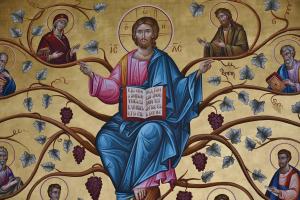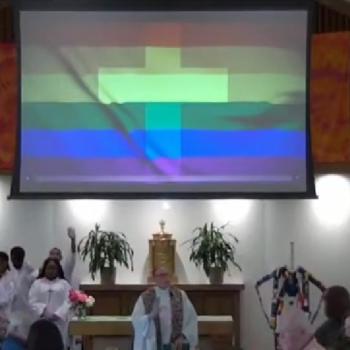Do Christians need creeds? Recently, an article from a fellow Patheos blogger stated creeds are not only unnecessary, but toxic. By standardizing belief that overturned heresies, creeds draw a line between people, “between us and them.” In this article, I examine the true nature of creeds and why they are of the utmost importance in the Christian life. I draw upon the life of an instrumental early Christian theologian, St. Athanasius, and show how the dismissal of the work of Christians like St. Athanasius disrespects early Christianity and the martyrs that died to safeguard the faith. To label such hard won creeds as toxic also does a great disservice to Christians martyrs throughout the history of the Church.
What Is a Creed?
Basically, a creed is the summation of true (orthodox) doctrinal statements for the purpose of unity. As such, creeds do not simply fall out of the sky and demand assent. No, creeds take time and consideration. A creed involves many minds, many committed followers of Jesus, to hash out truth from novelty, fact from fiction. During the first three centuries of the Church, three centuries of constant threats of persecution and death, language developed to speak about God: Father, Son, and Holy Spirit, in a way that made the most sense. This language was then taken by St. Athanasius and others to formulate creeds, like the Athanasian Creed.
St. Athanasius and the Church’s Fight for Orthodoxy
St. Athanasius’ birth fell somewhere in the late 290s, in or around the city of Alexandria, Egypt, to a Christian family. His early life took place during the Diocletianic or Great Persecution (AD 303 to 315), but there is no record of St. Athanasius personally experiencing persecution. The bishop of his youth, St. Peter of Alexandria, did suffer martyrdom in in AD 313. This tells us that, while he did not have firsthand personal experience of persecution, St. Athanasius had firsthand knowledge of persecution. St. Athanasius was also formed by other Christians who did have such experience.
Therefore, given this fact, and the past two centuries where countless Christians shed their blood for the truth of their faith, it does not take a leap of faith to understand the importance of doctrinal truth statements (creeds) to St. Athanasius and other like him. For St. Athanasius, this importance meant constant threats to his life and exile five times over.
So What?
Moreover, in the aforementioned blog, the author cites his student as saying, “so what?” to the creedal formulation regarding the nature of Christ within the Trinity. This author goes on to state what relevance did such a creedal statement have on the regular citizen of the empire. How did such a claim as “of one Being with the Father” truly impact a regular Christian? His inference is—not at all. Ultimately, the argument is made that creeds are a means of control. Creeds codify beliefs by limiting the definition of true belief (orthodoxy) and who can access it.
What Is the Cost of Orthodox?
Clearly, this author fails to understand the sufferings of countless early Christians who chose to die rather than to deny their faith, for a denial of the truth of their faith. Why die for your faith when such trivial things such as creeds only serve as a divide “between us and them.” Creeds matter because they were purchased in blood, the blood of the martyrs. Early Christians accepted death because they held their creeds as true. They refused to bow to falsehood. Therefore, such a sacrifice deserves respect, not dismissal.
Like what you read? Please check out my other writing here.
Please like and follow me on Facebook and Twitter.
Please support my writing through Patreon. Thank you!













